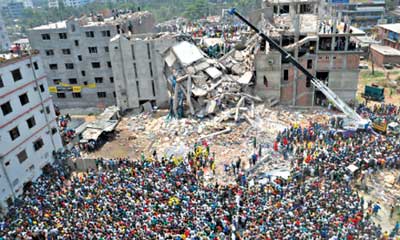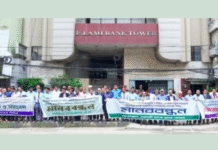Italian fashion brand Benetton is facing renewed pressure to contribute to a compensation fund for victims of the Bangladesh’s Rana Plaza factory disaster in which more than 1,100 people died, reports The Guardian.
Almost 1 million (10 lakh) people have signed a petition on Avaaz, the campaigning site, calling on the Italian company to contribute $5 million into a fund backed by the International Labour Organisation, a UN agency.
Two months before the second anniversary of the collapse of the Bangladeshi factory complex, where clothes were being made for Benetton and a number of other brands including Britain’s Primark, the fund remains $9 million short of the $30 million required to fully compensate victims and their families.
So far 5,000 people — injured workers and families of the deceased — have received only 40 per cent of the money due to them. There is enough in the pot to ensure they get 70 per cent.
‘The current funding gap is achievable if all brands that produced clothing at Rana Plaza step up and take responsibility. Without a contribution from Benetton, families cannot rebuild their lives,’ said Deborah Lucchetti from the Campagna Abiti Puliti, the Italian affiliate of the Clean Clothes Campaign that recently joined forces with Avaaz to ramp up pressure on Benetton.
Despite pressure from campaigners and even government ministers, Benetton has so far held back from contributing to the ILO-backed scheme. The company chose to back a separate victim support scheme led by BRAC, a Bangladeshi non-governmental organisation, saying wanted to move quickly to support those affected.
A spokesman said: ‘Through the programme with BRAC we have helped 280 victims and their families in a meaningful and constructive way with their immediate medical needs and to start new businesses so they can work on rebuilding their lives.’
But critics say Benetton’s work with BRAC does not amount to formal compensation.
Campaigners are also calling on retailers that have made only small donations to the fund, such as US chains Walmart and the Children’s Place, as well as the Bangladeshi Prime Minister’s Fund to contribute more to the compensation fund.
The biggest contributor is Primark, which is has paid out a total of $12 million in support for victims, $8 million of which counted as part of the ILO-backed scheme. It began making payments directly to workers more than a year ago.
Almost 1 million (10 lakh) people have signed a petition on Avaaz, the campaigning site, calling on the Italian company to contribute $5 million into a fund backed by the International Labour Organisation, a UN agency.
Two months before the second anniversary of the collapse of the Bangladeshi factory complex, where clothes were being made for Benetton and a number of other brands including Britain’s Primark, the fund remains $9 million short of the $30 million required to fully compensate victims and their families.
So far 5,000 people — injured workers and families of the deceased — have received only 40 per cent of the money due to them. There is enough in the pot to ensure they get 70 per cent.
‘The current funding gap is achievable if all brands that produced clothing at Rana Plaza step up and take responsibility. Without a contribution from Benetton, families cannot rebuild their lives,’ said Deborah Lucchetti from the Campagna Abiti Puliti, the Italian affiliate of the Clean Clothes Campaign that recently joined forces with Avaaz to ramp up pressure on Benetton.
Despite pressure from campaigners and even government ministers, Benetton has so far held back from contributing to the ILO-backed scheme. The company chose to back a separate victim support scheme led by BRAC, a Bangladeshi non-governmental organisation, saying wanted to move quickly to support those affected.
A spokesman said: ‘Through the programme with BRAC we have helped 280 victims and their families in a meaningful and constructive way with their immediate medical needs and to start new businesses so they can work on rebuilding their lives.’
But critics say Benetton’s work with BRAC does not amount to formal compensation.
Campaigners are also calling on retailers that have made only small donations to the fund, such as US chains Walmart and the Children’s Place, as well as the Bangladeshi Prime Minister’s Fund to contribute more to the compensation fund.
The biggest contributor is Primark, which is has paid out a total of $12 million in support for victims, $8 million of which counted as part of the ILO-backed scheme. It began making payments directly to workers more than a year ago.
Source: New Age










